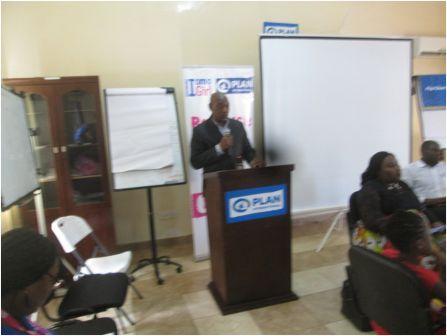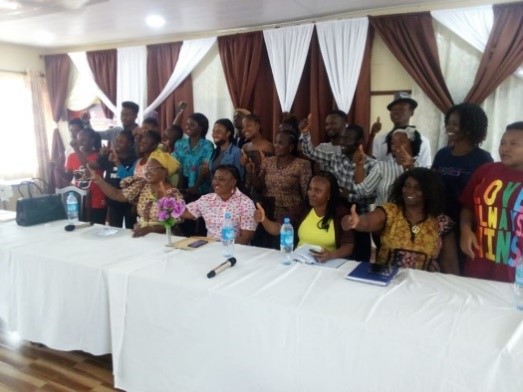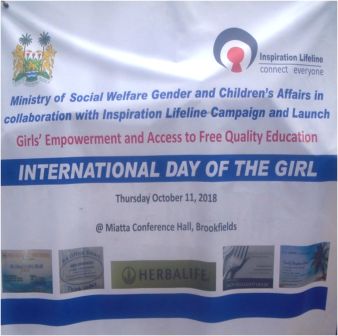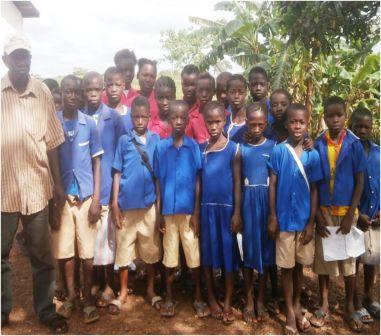Plan International Sierra Leone concludes 2-day Media Orientation Workshop
Thirty-five (35) journalists from both the print and electronic media have concluded a two-day intensive media orientation training on child protection and gender sensitive reporting organized by Plan International Sierra Leone at its Country Office on Cantonment Road off Kingharman Road, Freetown, from Tuesday 9th to Wednesday 10th August, 2016.
In his opening remarks, the Deputy Country Director of Plan International Sierra Leone, Mr. Farai Zisengwe, heartily welcomed participants to the training which he said would help increase their media knowledge on how to report on gender and child protection issues.
Ms. Emmanuela Emanuel, who represented the children, extended greetings to the participants on behalf of Sierra Leonean children with particular reference to the children of ‘YACAN Pikin Varanda Platform’.
She emphasized that the media orientation training initiative by Plan International clearly indicated its commitment to training journalists in both the print and electronic media on how to improve the way of reporting and presenting stories on children especially children who use the media to advocate on issues that affect the girl-child through the ‘YACAN Pikin Varanda Radio’ programme on Radio Democracy FM 98.1 every Sunday.
Ms. Emmanuela Emanuel described the abuse of children as a human right violation that impedes their development, adding that not only child abuse is on the increase in Sierra Leone but in the African as well. But she however lamented that the stories of child abuse are either inadequately reported or are left untold.
Ms. Emmanuela Emmanuel therefore appealed to media practitioners to help disseminate information on child abuse.
Madam Kadiatu Bachalle-Taylor, who presented statement on gender awareness, dilated on the concept of gender and sex.
Madam Mariama Zombo, the facilitator on Gender, Women’s Rights and Justice linked the concept to the Independent Media Commission (IMC) Media Code of Practice with regards to media guidelines for reporting on Gender Based Violence (GBV), while the Child Protection and Child Rights Advisor at Plan International Sierra Leone, Madam Ramatu Kargbo, elaborated on the meaning of child protection in development and in emergencies.
There were many other speakers including the President of Sierra Leone Association of Journalists (SLAJ), Kelvin Lewis, IMC Commissioner, Patricia Ganda and other stakeholders before the commencement of the intensive media orientation training.
During the first day of the training, Madam Zainab Zombo, who was one of the facilitators, lectured on Gender, Women’s Rights and Justice. She dilated on Women’s Rights Instruments as follows: Beijing Declaration and Platform for Action, CEDAW, UDHR, ACRWC, and the MAPUTO PROTOCOL.
The facilitator also explained the three (3) Gender Laws and Sexual Offences Act in Sierra Leone and the international conventions for the right of the child.
On Women’s Rights Struggle, Madam Zainab Zombo explained that despite great strides made by the International Women’s Rights Movement over many years, women and girls around the world are still married as children or trafficked into forced labor and sex slavery.
She added that they are refused access to education and political participation, and some are trapped in conflicts where rape is perpetrated as a weapon of war. Around the world, Madam Zainab Zombo said, deaths related to pregnancy and childbirth are needlessly high, and women are prevented from making deeply personal choices in their private lives.
WOMEN’S RIGHTS
Madam Mariama Zombo further explained that violence against women has been defined to include “any act of gender-based violence that results in, or is likely to result in, physical, sexual or mental harm or suffering to women, including threats of such acts, coercion or arbitrary deprivation of liberty, whether occurring in public or in private life.”
GENDER JUSTICE
Madam Mariama Zombo explained that Gender Justice is the ending of inequalities between females and males that result in women and girls’ subordination to men and boys, adding that Gender Justice drives awareness to: the fundamental injustice of gender inequality, the responsibility of duty bearers to respect, protect and fulfil human rights, particularly of girls and women, Plan’s resolve to “tackle gender injustice head on”.
The facilitator also said that Gender Justice is the journey (process) and the destination (outcome). “The journey lets us identify our role in eliminating gender-based rights violations. The destination lets us envision a world where girls/women and boys/men have equal access and control over resources, and equal power over their lives,” she explained.
Madam Mariama Zombo furthered that Gender Justice is an outcome as well as a process. She explained: “As an outcome, it is the ending of inequalities between females and males that result in women and girls subordination to men and boys. As a process, it is holding duty bearers accountable to respect protect and fulfil human rights, particularly of girls and women.
The facilitator said condition refers to women’s material state and daily life which includes access to basic resources such as shelter, food and protection, while position refers to their social status and to the value that society places on them which includes their ability to control resources and to make the decisions that affect their lives.
Madam Mariama Zombo explained that to promote gender justice, we need to identify and address the practical gender needs and strategic gender interests of girls and women as rights-holders.
“This allows us to assess what our programmes and policies are achieving: improvements in the daily condition of girls and women and/or improvements in their social position,” she said.
The facilitator also dilated on how we link our gender awareness to the Independent Media Commission (IMC), Gender-Based Violence (GBV) and media guidelines for reporting Gender-Based Violence (GBV)
Dilating on survivors’ best interests, Madam Mariama Zombo said that children have an absolute right to privacy, noting that the highest ethical and professional standards in reporting and covering cases of children must be observed such that in all publicity concerning children, the best interests of the child shall be the primary concern
She also warned against the use of judgmental language. “Writing about a survivor’s history, her/his sexual practices or sexual orientation, what she/he was wearing, where she/he was, what she/he was doing, or what time of day the abuse occurred could imply survivor blame,” the facilitator said.
Madam Mariama also warned against reporting details that could put survivors at further risk such as names, photographs, or other identifying information of survivors, their family members….
The facilitator advised journalists to consult GBV experts that are familiar with the context, noting that the input of local GBV experts will always increase the depth of understanding by providing relevant contextual information.
She also advised journalists to provide information on local support services and organizations that are addressing GBV in the context.
Madam Zombo dilated on ethical and safe survivor interviews. “Sensitive reporting means ensuring that the media interview meets the needs of the survivor,” she advised, noting that “when interviewing female survivors, a female interviewer and interpreter should be on hand. It is important that the interpreter is briefed about confidentiality.”
The facilitator also dilated on Gender Communication for Development which she said is about changing attitudes and behaviours and different from traditional one-way media which includes large-scale media campaign, social marketing, dissemination of printed materials, education, entertainment, among others.
She furthered that Communication for Development focuses on interpersonal communication – face-to- face communication that can either be one-on-one or in small groups, adding that while mass media allows for the learning of new ideas, interpersonal networks/Communication for Development encourage the shift from knowledge to continued practice.
Madam Zombo said community radio is considered to be an effective tool in promoting women’s empowerment and participation in governance structures. According to her, “Radio is often the primary source of information for women. It is accessible to local communities, transcends literacy barriers and uses local languages.”
GENDER, WOMEN AND GIRLS IN THE MEDIA
Explaining about media content and portrayal of men and women in the media, Fatou Wurie emphasized that those working in the media should do more to confront gender distortions in newsrooms. She observed that “unbalanced gender portrayal is widespread. Women are more likely than men to be featured as victims in news stories and to be identified according to family status. Women are also far less likely than men to be featured in the world’s news headlines, and to be relied upon as ‘spokespeople’ or as ‘experts’. Certain categories of women, such as the poor, older women, or those belonging to ethnic minorities, are even less visible in the media.”
On media content and portrayal of men and women in the media, the facilitator said that stereotypes are also prevalent in every day media. “Women are often portrayed solely as homemakers and carers of the family, dependent on men, or as objects of male attention,” Madam Wurie noted.
GENDER INBALANCES IN MEDIA–WHAT TO DO?
The facilitator explained that we should get gender parity on expert panels on television or radio and the creation of a thematic database of women to be interviewed and used as experts by media professionals. She added that conscious efforts should be made to portray women and men in non-stereotypical situations.
Madam Wurie also asked for the involvement of women and girls in participatory community media – as producers and contributors of media content and not solely as ‘consumers,’ noting that such initiatives will encourage the involvement of women in technical, decision-making, and agenda-setting activities. “Builds their capacity as sociopolitical leaders,” she stressed.
WOMEN WORKING IN MEDIA
On the participation and influence of women in the media, Madam Wurie said studies have found that although the number of women working in the media has been increasing globally, the top positions (producers, executives, chief editors and publishers) are still very male dominated (White, 2009). “This disparity is particularly evident in Africa, where cultural impediments to women fulfilling the role of journalist remain, such as travelling away from home, evening work and covering issues such as politics and sports which are considered to fall within the masculine domain (Myers, 2009).
She quoted the Global Media Monitoring Project (GMMP) reports which state that “throughout the world, female journalists are more likely to be assigned ‘soft’ subjects such as family, lifestyle, fashion and arts. The ‘hard’ news, politics and the economy, is much less likely to be written or covered by women.”
On the marginalisation of women in the media, Fatou Wurie stated that “even in countries such as the USA, where women are the majority of students in journalism courses, only a small percentage of these women go on to work in the media.
On the second day of the intensive media orientation training, Madam Fatou Wurie lectured on social media as a powerful vehicle for social transformation and communication.
The facilitator explained the use of social media for transformation, such as WordPress, Tumbler, Facebook, Twitter, Instagram, Pintrest and WhatsApp.
She spoke on how to begin to transform digital space in Sierra Leone positively, citing cyber bullying, online bullying, facebook depression, whatsapp bullying and sexting as some of the ways.
The facilitator also lectured on quick techniques using data driven quote boxes, your phone to make videos / work with celebrities, hashtag a movement, and promote positive messaging (videos/quotes) from children/young girls/women.
Madam Fatou Wurie also dilated on how we focus on transformation in traditional and social/digital media. According to her, journalists should strive for standards of excellence in terms of accuracy and sensitivity when reporting on issues involving children.
Ramatu Kargbo, Child Protection Advisor, Facilitated on Child protection and gender rights and Convention on the Rights of the Child (CRC) reporting challenges for journalists in Sierra Leone. The day commenced with group study and case studies on the Convention of the Rights of the Child with regards to what it requires, such as children be seen as important subjects for the media; children contribute a greater voice to the media; children are portrayed more accurately and with greater depth in the media; and, the voices and realities of children are reflected with due regard to ethics and the rights of the child.
Madam Kargbo also dilated on the four principles of the CRC which include non-discrimination, best interests of the child, the right to life, survival and development, and respect for the views of the child.
Madam Fatou Wurie also dilated on how we focus on transformation in traditional and social/digital media. According to her, journalists should strive for standards of excellence in terms of accuracy and sensitivity when reporting on issues involving children.
Madam Kargbo admonished participants to avoid programming and publication of images which intrude upon the media space of children with information which is damaging to them; avoid the use of stereotypes and sensational presentation to promote journalistic material involving children; consider carefully the consequences of publication of any material concerning children and shall minimise harm to children; guard against visually or otherwise identifying children unless it is demonstrably in the public interest; ensure independent verification of information provided by children and take special care to ensure that verification takes place without putting child informants at risk; avoid the use of sexualised images of children; verify the credentials of any organisation purporting to speak for or to represent the interests of children; and not make payment to children for material involving the welfare of children or to parents or guardians of children unless it is demonstrably in the interest of the child.
At the end of the two-day intensive media orientation training, participants were encouraged to put into practice the knowledge they have gained in child protection and gender sensitive reporting. The training was climaxed by the distribution of certificates of participation to the thirty-five journalists.
Stay with Sierra Express Media, for your trusted place in news!
© 2016, https:. All rights reserved.








